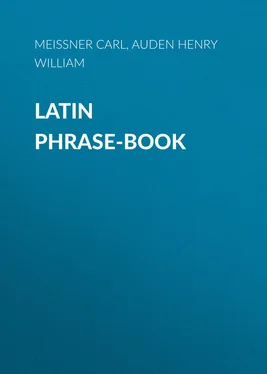Carl Meissner - Latin Phrase-Book
Здесь есть возможность читать онлайн «Carl Meissner - Latin Phrase-Book» — ознакомительный отрывок электронной книги совершенно бесплатно, а после прочтения отрывка купить полную версию. В некоторых случаях можно слушать аудио, скачать через торрент в формате fb2 и присутствует краткое содержание. Жанр: foreign_antique, foreign_prose, на латинском языке. Описание произведения, (предисловие) а так же отзывы посетителей доступны на портале библиотеки ЛибКат.
- Название:Latin Phrase-Book
- Автор:
- Жанр:
- Год:неизвестен
- ISBN:нет данных
- Рейтинг книги:5 / 5. Голосов: 1
-
Избранное:Добавить в избранное
- Отзывы:
-
Ваша оценка:
- 100
- 1
- 2
- 3
- 4
- 5
Latin Phrase-Book: краткое содержание, описание и аннотация
Предлагаем к чтению аннотацию, описание, краткое содержание или предисловие (зависит от того, что написал сам автор книги «Latin Phrase-Book»). Если вы не нашли необходимую информацию о книге — напишите в комментариях, мы постараемся отыскать её.
Latin Phrase-Book — читать онлайн ознакомительный отрывок
Ниже представлен текст книги, разбитый по страницам. Система сохранения места последней прочитанной страницы, позволяет с удобством читать онлайн бесплатно книгу «Latin Phrase-Book», без необходимости каждый раз заново искать на чём Вы остановились. Поставьте закладку, и сможете в любой момент перейти на страницу, на которой закончили чтение.
Интервал:
Закладка:
63
Not occasio opportuna, bona, pulchra , the notion "favourable" being contained in the word itself. We find, however, occasio praeclara, ampla, tanta , not unfrequently.
64
Notice potestatem alicui pugnandi facere , to offer battle, and potestatem sui facere alicui , (1) to give opportunity of battle, and also (2) to grant an audience to (cf. sui conveniendi potestatem facere ).
65
In the same way deesse officio , to leave one's duties undone; d. muneri , to neglect the claims of one's vocation; d. rei publicae , to be careless of state interests, to be unpatriotic; d. sibi , not to do one's best.
66
beatitas and beatitudo are used by Cicero in one passage only (De Nat. Deorum, 1. 34. 95), but merely as a linguistic experiment.
67
In Latin metaphor the verb only, as a rule, is sufficient to express the metaphorical meaning – e.g. amicitiam iungere cum aliquo , to be bound by the bands of affection to any one; religionem labefactare , to undermine the very foundations of belief; bellum exstinguere , to extinguish the torch of war; cuncta bello ardent , the fires of war are raging all around; libido consedit , the storm of passion has ceased; animum pellere , to strike the heart-strings; vetustas monumenta exederat , the tooth of time had eaten away the monuments.
68
The first meaning of exercere is to keep in motion, give no rest to. Then, metaphorically, to keep busy, to harass – e.g. fortuna aliquem vehementer exercet . Lastly, exercere is used to express the main activity in any branch of industry, thus, exercere agros , to farm; metalla , to carry on a mining industry; navem , to fit out ships, be a shipowner; vectigalia , to levy, collect taxes, used specially of the publicani ; qui exercet iudicium , the presiding judge ( praetor ).
69
vocare helps to form several phrases – e.g. in invidiam, in suspicionem, in dubium, ad exitium, in periculum vocare . It is used in the passive to express periphrastically the passive of verbs which have only an active voice – e.g. in invidiam vocari , to become unpopular, be hated, invideor not being used. Cf. in invidiam venire .
70
Similarly descendere is frequently used of consenting unwillingly to a thing, condescending. Cf. vi. 9 ad fin. and xvi. 9.
71
Notice too poena praesens , instant punishment; pecunia praesens , ready money; medicina praesens , efficacious remedy; deus praesens , a propitious deity; in rem praesentem venire , to go to the very spot to make a closer examination.
72
Also fructum alicuius rei capere, percipere, ferre, consequi ex aliqua re – e.g. virtutis fructus ex re publica (magnos, laetos, uberes) capere = to be handsomely rewarded by the state for one's high character.
73
Notice too calamitatem, cladem, incommodum accipere , to suffer mishap, reverse, inconvenience; naufragium facere , to be shipwrecked.
74
damnum (opp. lucrum ) = loss, especially of worldly possessions; detrimentum (opp. emolumentum ) = harm inflicted by others; fraus = deceitful injury; iactura (properly "throwing overboard") = the intentional sacrifice of something valuable in order either to avert injury or to gain some greater advantage. "Harmful" = inutilis, qui nocet , etc., not noxius , which is only used absolutely – e.g. homo noxius , the offender, evildoer.
75
Probably originally omnia alicuius causa velle = to wish everything (favourable) in some one's behalf.
76
But se convertere ad aliquem = either (1) to approach with hostile intention, or (2) to turn to some one for sympathy or assistance.
77
animus is used similarly in several periphrases to express abstract qualities – e.g. animus inexorabilis = inflexibility, severity; animus implacabilis = implacability; animus (fides) venalis = venality. Cf. simplices mores, simplex natura, ratio, genus = simplicity ( simplicitas is post-Augustan and usually = frankness, candour). immemor ingenium = forgetfulness ( oblivio in this sense is not classical).
78
mereri is a middle verb, and consequently always has an adverb with it.
79
Notice the numerous phrases of which afficere is a part – e.g. afficere aliquem admiratione, beneficio, exilio, honore, iniuria, laude, poena, supplicio . Especially important is its passive use – e.g. affici admiratione , to admire; gaudio, voluptate , to rejoice, be pleased; dolore , to be pained, vexed; poena , to suffer punishment.
80
The singular inimicitia is only used to express the abstract idea "enmity".
81
Not commemorare , the fundamental meaning of which is "to make a person mindful of…" and implies an emphatic reference to a definite point.
82
In the same way, to improve a man, alicuius mores corrigere (not aliquem c. ); to understand some one, alicuius orationem or quid dicat intellegere .
83
existimatio has two uses: (1) active – opinion held by others, criticism; (2) passive – reputation, character, usually in a good sense, consequently = good reputation without the addition of bona, integra , etc.
84
opus always means the concrete work on which one is engaged; labor is the trouble, fatigue, resulting from effort; opera is the voluntary effort, the trouble spent on an object. Thus laborare = not simply to work, but to work energetically, with exertion and consequent fatigue; operari , to be busy with a thing. Terence thus distinguishes opus and opera : quod in opere faciundo operae consumis tuae . Cf. Verg. Aen. 1. 455 operumque laborem miratur = the trouble with such huge works must have cost.
85
nervi properly = sinews, muscles, not nerves the existence of which was unknown to the ancients. Metaphorically nervi denotes not only strength in general but also specially – (1) vital power, elasticity, e.g. omnes nervos virtutis elidere (Tusc. 2. 11. 27), incīdere , to paralyse the strength of virtue; (2) motive power, mainspring, essence, of a thing, e.g. vectigalia nervi rei publicae sunt (Imp. Pomp. 7. 17), nervi belli pecunia (Phil. 5. 2. 15).
86
abuti properly = to consume, make full use of. From this is developed the rarer meaning to use in excess, abuse = perverse, intemperanter, immoderate uti . Abuse, misuse = pravus usus, vitium male utentium, insolens mos . abusus is only found in the Jurists, and abusio is a technical term of rhetoric = κατάχρησις .
Читать дальшеИнтервал:
Закладка:
Похожие книги на «Latin Phrase-Book»
Представляем Вашему вниманию похожие книги на «Latin Phrase-Book» списком для выбора. Мы отобрали схожую по названию и смыслу литературу в надежде предоставить читателям больше вариантов отыскать новые, интересные, ещё непрочитанные произведения.
Обсуждение, отзывы о книге «Latin Phrase-Book» и просто собственные мнения читателей. Оставьте ваши комментарии, напишите, что Вы думаете о произведении, его смысле или главных героях. Укажите что конкретно понравилось, а что нет, и почему Вы так считаете.

![Рис Хьюз - Madonna Park[e-book - рассказы]](/books/94285/ris-hyuz-madonna-park-e-book-rasskazy-thumb.webp)










